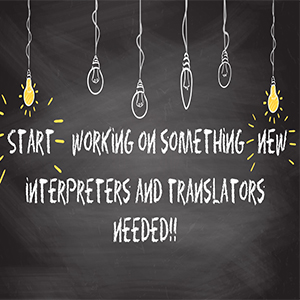How to become an Interpreter and Translator
 The requirement for the language experts has accelerated at an unprecedented spurt in India. Language skills open up an ample range of specialist career path including translator and interpreter as a career option in India and abroad.
The requirement for the language experts has accelerated at an unprecedented spurt in India. Language skills open up an ample range of specialist career path including translator and interpreter as a career option in India and abroad.
Translator vs. Interpreter – the key difference
Translator and Interpreters aid communication by converting messages or text from one language into another language. Although interpreter and translator are two different professions some people do both: Interpreters work with spoken communication and the translator works with written communication. Each necessitates a distinct set of skills and aptitudes and most people are better suited for one or the other.
A translator translates written materials from one language into another language. The translator must be able to inscribe sentences that sustain or copy the structure and style of the original meaning while keeping the ideas and facts of the original meaning accurate. Translators must suitably transmit any cultural references, including slang, and other expressions that do not translate literally. They must have excellent writing and analytical ability. And because the documents they translate must be flawless as possible, they also need good editing skills. Translators’ assignments may vary in subject matter, Length, writing, and style.
The interpreter interprets information from one spoken language into another or in the case of sign language interpreters, between spoken language and sign language. The aim of an interpreter is to have people hear the interpretation as if it were the original language. Typically Interpreters must be fluent speakers or signers of both languages because they communicate back and forth among people who do not share a common language. Interpreters need to understand what is communicated in both languages and express thoughts and ideas clearly. Strong research and analytical skills, mental dexterity and an excellent memory also are important.
Education for Interpreter and Translator
To become an interpreter or translator a bachelor's degree is typically needed along with proficiency in at least two languages, one of which is usually English. Adopting interpreter and translator as a profession one has to go for a diploma or degree course in the desired language from various universities/institutions offering these courses. After completing the course one can join as a junior translator or interpreter or go for the higher studies in the respective language provided by various universities/institutions. Like for French, there is a language proficiency test conducted by Alliance Française for various French test like the TEF (required by the Canadian High Commission), DELF/DALF test and diploma delivered by the French Ministry of Education.
Career scope and job opportunities
With the growing Indian economy, multinational companies are making a beeline for India and the job scenario for expertise in foreign languages have been opened up as more and more companies are going for joint ventures abroad. The Job opportunities for Interpreter and translator can be found in private as well as in public sectors organization. They can find employment in the corporate sector in software developing companies and in newspaper/magazines or one can also work as a freelancer.
Working condition and pay are generally good which can rise with experience and specialization. Salaries may range from Rs. 25,000 to Rs. 1 lakh a month. One can also work as a freelance and earn Rs. 2,000-4,000 a day in translation work.
Employment of interpreters and translators is expected to grow 46 percent from 2012 to 2022, much faster than the average for all occupations. Since French and Spanish are the two most spoken foreign languages, the demand for French or Spanish translator and interpreter is high.

